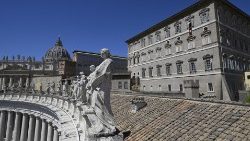Pope at Angelus: Respond to opposition with firm decision to do good
By Christopher Wells
Jesus’s decision to go to Jerusalem was a turning point, Pope Francis said at the Angelus on Sunday, because He knew it meant facing rejection, suffering, and death.
The Pope pointed out that we, too, are called to make a firm decision for our lives “if we want to be disciples of Jesus.” Sunday’s Gospel passage, he said, can help us see what this decision involves; because “we must be disciples of Jesus in earnest, with real determination, and not—as an elderly lady I knew used to say—'rosewater Christians.’ No, no, no! [We must be] serious Christians!”
Turning to God when we face opposition
In the day's Gospel reading, Sts James and John ask Jesus if they should call down heavenly fire on the Samaritan town that rejects Jesus. The Lord rejects their suggestion and rebukes the disciples, “because the ‘fire’ that Jesus came to bring on the earth is the merciful love of the Father.”
Pope Francis explained that—like James and John, who “allow themselves to be overcome by anger”—we can become angry even when engaged in good works if things do not go according to our plan. Jesus, instead, takes a different path, the Pope said, “that of a resolute decision which, far from translating into harshness, implies calm, patience, longsuffering, not slackening the least bit in doing good.”
Responding to opposition by doing good
The Holy Father insisted that when we meet opposition, we must, like Jesus, “turn toward doing good elsewhere, without recrimination.” He challenged his listeners, “In the face of opposition, misunderstanding, do we turn to the Lord?” Do we ask for His help, or do we end up bitter and resentful when our efforts are not applauded?
He invited us to “ask Jesus for the strength of being like him, of following him with a firm decision, not to be vindictive and intolerant when difficulties present themselves, when we spend ourselves in doing good and others do not understand this.”
Thank you for reading our article. You can keep up-to-date by subscribing to our daily newsletter. Just click here





